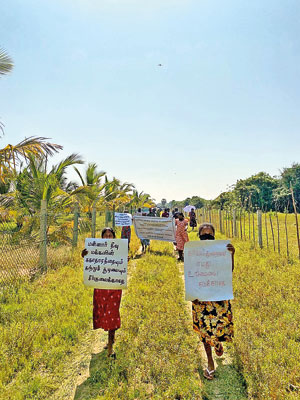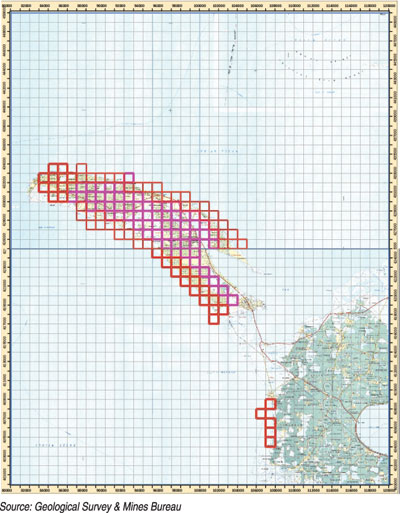News
Environment regulator allows unlicensed Australian sand miner’s prep work
View(s):By Mimi Alphonsus
Sri Lanka’s Central Environmental Authority (CEA) has granted the Australian company, Titanium Sands Limited, a terms-of-reference (ToR) for a heavy mineral sand mining project in Mannar island.
Against standard procedure, the ToR was issued even though Titanium does not have a valid exploration licence from the Geological Survey and Mines Bureau (GSMB).
The ToR sets out the framework for conducting an Environmental Impact Assessment (EIA), after which Titanium would apply for an industrial mining licence — via their local subsidiaries — to begin dredging for Ilmenite, Rutile and other minerals. At this stage, mining will cover 294 acres.
However, Titanium along with another company, Mars Metals, have been carrying out large-scale mineral explorations in almost all of Mannar Island, amounting to around 30,000 acres.

Villagers hold protests
The ToR is important because relevant stakeholders — the Water Board, Forestry Department, and the Coastal Conservation Department among them — present their concerns and include requirements to be addressed in the EIA. Titanium will then employ environmental consultants to produce an EIA in line with the ToR. This EIA will then be open for public comment and finally be approved or rejected by the CEA (as the apex approving body). Only then, can Titanium obtain an industrial mining licence from GSMB and begin extracting minerals.
ToRs are granted after meetings and site inspections with relevant government agencies. However, due to protests, the CEA and other agencies have been unable to comprehensively study the area. As a result the ToR was delayed.
In an attempt to resolve the delays, an ad-hoc meeting was organised in May 2024 at the behest of the former Presidential Secretariat to “understand the views of the community and give an opportunity to the investor to explain the benefits of the project.”
The meeting proved unsuccessful, however, and protests continued unabated. The CEA consulted with the Attorney General who advised them to proceed with site visits and complete the ToR.
However, in October 2024 the GSMB halted issuing all licences due to a Supreme Court judgement. The court ruled that mining licences need to be distributed with consideration for “intra-generational equity” and that the existing system of granting licences violates this principle by preventing competition which would grant better terms to the state and people. GSMB had been thus far granting licenses on a “first come first serve” basis — not open bidding.
GSMB has been in discussions with the Attorney General about how to amend its policy in line with the Supreme Court decision. Until then it has stopped granting, renewing, or retaining licences for six months, leaving investors like Titanium frustrated. As of November 2024, four of their valuable licences have expired without being officially “retained” (a type of licence given to companies after exploration is complete to give them time to complete EIAs and obtain a mining licence).
Titanium has attempted to proceed with the project despite not having a licence.
On January 17, the director of Orion Minerals (Titanium’s local subsidiary) requested that GSMB issue letters stating that their retention has been approved even if it cannot be “officially” released due to the Supreme Court judgement. 
GSMB’s then-Director General obliged with a letter stating that GSMB has recommended a retention of Titanium’s licences but that due to “an internal administration issue” is unable to release official extensions. “Once the above matter gets sorted out, we will make arrangements to release the relevant letter as soon as possible,” it noted.
Titanium’s project chugged on, unhampered by the Supreme Court judgement. On February 19 government agencies including the CEA, Board of Investment, National Water Supply and Drainage Board, District Secretary, and GSMB made a final site visit. After half an hour at the location, again met with protesters, the party left. On March 20, the ToR was issued.
CEA’s new Director General, Padmasiri Moonamale, told the Sunday Times that the agency was unaware of the fact that Titanium’s retained licences had expired when they issued the ToR. Despite the opportunity to comment on the draft ToR as well as physically meeting CEA officials during the February 19 site inspection, GSMB failed to update CEA on the licensing issue — in writing or verbally.
T. Dahanayake, the director of mineral titling for the GSMB defended the decision not to inform CEA. “It is CEA’s responsibility to check the validity of licences before issuing ToRs. They did not explicitly ask us.”
Mr. Moonamale said they would have to clarify the issue with all stakeholders and take a decision on the future of the project. He did not confirm whether the ToR would be cancelled in light of the procedural discrepancies.
Titanium denied any wrongdoing and maintained that it has operated strictly according to the rules and regulations. “This is a project of national interest, which will benefit the poverty facing communities of Mannar,” it said.
The project is around the villages of Thoddaveli and Konnayan Kudiyiruppu, a rural, sandy area covered with palmyrah trees. The villagers mainly rely on palmyrah industries and animal herding for a living. The community has been protesting against the project for years. An injunction was issued against 10 people before the last site visit on 19 February. STF and police accompanied the government agencies.
Even so, about 100 protesters from the villages followed the caravan of government agency pickups and tractors on foot to make their discontent felt. “Are you trying to bury us in mineral sands?” read one sign. “Anura government, are you slaves to corporate companies?” read another. One protester expressed her mistrust in the government’s procedures — including EIA processes. She fears that the project will destroy the island and her way of life.
| Environmental complaints taint Mannar Island projectTitanium’s sand mining project has proved controversial due to procedural discrepancies in licensing, allegations of land grabbing, and environmental concerns — all previously reported by the Sunday Times.Mannar Island is largely beneath sea level and the project is about a kilometre from the Vidataltivu nature reserve. According to officials at the National Water Supply and Drainage Board, Thoddaveli, where part of the sand mining is to take place, is also where one of the islands two freshwater aquifers are present — at about five metres below ground. Documents obtained from the CEA show that Titanium plans to dredge at a depth of 10-12m. Locals and Water Board officials worry that the mining would lead to salt water contamination of these aquifers, in addition to other environmental concerns. K. S. Sivanesan, Titanium’s environmental consultant, anticipates that it will take at least two months to complete the EIA. Moreover, other projects such as the Thambapavani windmills, the halted Adani wind power project, and the Mars Metals mineral sands project, have raised concerns among environmental organisations including Wildlife and Nature Protection Society, Centre for Environmental Justice, and Environmental Foundation Limited. They argue that the combined environmental impact of these projects will be far more severe than accounted for in isolated EIAs. Individual project EIAs tend to focus only on the relevant project and not evaluate its compounding of existing cumulative impacts, they stated. The organisations recommended an all-encompassing strategic environmental assessment of the holding capacity of Mannar Island before any further large-scale projects. Indeed, the CEA and Disaster Management Centre did carry out an “integrated strategic environmental assessment” of the entire Northern province in 2014. They found that “uncoordinated mineral extraction” would likely affect water supply, water quality, forestry, terrestrial biodiversity, marine biodiversity, cultural heritage, soil and agriculture, and natural disasters. Among the five districts of the Northern province, Mannar and Mullaitivu face the highest risk. Titanium’s mineral sands project, which is entirely foreign owned, is seeking Board of Investment approval under section 17 which would grant it special incentives and tax concessions. According to BOI documents it is expected that Titanium will invest US$81.84 million and create 106 local jobs. Minerals will be extracted entirely for export, without domestic value addition. | |
The best way to say that you found the home of your dreams is by finding it on Hitad.lk. We have listings for apartments for sale or rent in Sri Lanka, no matter what locale you're looking for! Whether you live in Colombo, Galle, Kandy, Matara, Jaffna and more - we've got them all!

